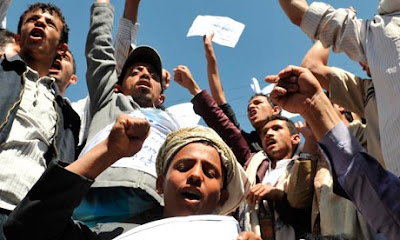Egypt protest spreads across Middle East –with teargas and arrests

By Ean Black
Egypt's uprising has sent powerful shockwaves across the Middle East , with demonstrations and street clashes as far afield as Iran, Bahrain and Yemen.
As protests and strikes erupted across Egypt, thousands of Iranians defied a government ban and volleys of teargas to join a rally in Azadi Square in the centre of Tehran. The protests were the biggest since those that erupted following the disputed 2009 presidential elections.
Mir Hossein Mousavi, leader of the Green movement, was placed under house arrest, as was Mehdi Karroubi, another prominent opposition figure. Protest rallies were also held in Isfahan and Shiraz.
Iran's Islamic regime has hailed the uprisings in both Egypt and Tunisia, though neither involved organised activity by Islamist opposition movements, but instead were led by young people seeking political freedoms and an end to autocracy – just like many Iranian demonstrators.
Large numbers of police and security forces, wearing riot gear and many mounted on motorbikes, were stationed around Tehran's main squares. Mobile phone connections were down in the area of the protests.
Unrest in the Gulf island state of Bahrain on a "day of rage" organised by activists using Twitter and Facebook appeared to be similarly inspired by events in Cairo and Tunis but rooted in local factors, especially anger at discrimination against the Shia majority by the Sunni Al-Khalifa dynasty.
It was the first sign of post-Egypt unrest anywhere in the wealthy Gulf states. Riot police fired teargas and rubber bullets at demonstrators demanding the release of Shia detainees. "Our movement is peaceful and our demands are legitimate," read one slogan. At least 14 people were injured in Newidrat village in the south-west of the kingdom — a key western ally that hosts the US fifth fleet. "We are only asking for political reforms, right of political participation, respect for human rights, stopping of systematic discrimination against Shias," activist Nabeel Rajab told al-Jazeera. Rajab later reported that one person had died of injuries sustained during the protests.
In the Yemeni capital Sana'a protesters marched for a fourth consecutive day, demanding the removal of President Ali Abdullah Saleh. Saleh, who has ruled the Arab world's poorest country since 1978, pledged recently not to run again for the presidency in 2013, but opposition forces are demanding that he emulate Egypt's Hosni Mubarak and step down at once. They faced attacks by government supporters wielding broken bottles, daggers and rocks. Police were unable to control the crowds in Taiz, where thousands of Yemeni protesters had held a night-long rally. The disturbances occurred while Saleh and the main opposition group were preparing for talks that the government hoped would help avert an Egyptian-style revolt.
In the West Bank town of Ramallah, the Palestinian prime minister, Salam Fayyad, sacked his entire cabinet in what was widely interpreted as a gesture intended to satisfy growing calls for reform across the Arab world – though there too, local political factors are at work.
Source: The Guardian
As protests and strikes erupted across Egypt, thousands of Iranians defied a government ban and volleys of teargas to join a rally in Azadi Square in the centre of Tehran. The protests were the biggest since those that erupted following the disputed 2009 presidential elections.
Mir Hossein Mousavi, leader of the Green movement, was placed under house arrest, as was Mehdi Karroubi, another prominent opposition figure. Protest rallies were also held in Isfahan and Shiraz.
Iran's Islamic regime has hailed the uprisings in both Egypt and Tunisia, though neither involved organised activity by Islamist opposition movements, but instead were led by young people seeking political freedoms and an end to autocracy – just like many Iranian demonstrators.
Large numbers of police and security forces, wearing riot gear and many mounted on motorbikes, were stationed around Tehran's main squares. Mobile phone connections were down in the area of the protests.
Unrest in the Gulf island state of Bahrain on a "day of rage" organised by activists using Twitter and Facebook appeared to be similarly inspired by events in Cairo and Tunis but rooted in local factors, especially anger at discrimination against the Shia majority by the Sunni Al-Khalifa dynasty.
It was the first sign of post-Egypt unrest anywhere in the wealthy Gulf states. Riot police fired teargas and rubber bullets at demonstrators demanding the release of Shia detainees. "Our movement is peaceful and our demands are legitimate," read one slogan. At least 14 people were injured in Newidrat village in the south-west of the kingdom — a key western ally that hosts the US fifth fleet. "We are only asking for political reforms, right of political participation, respect for human rights, stopping of systematic discrimination against Shias," activist Nabeel Rajab told al-Jazeera. Rajab later reported that one person had died of injuries sustained during the protests.
In the Yemeni capital Sana'a protesters marched for a fourth consecutive day, demanding the removal of President Ali Abdullah Saleh. Saleh, who has ruled the Arab world's poorest country since 1978, pledged recently not to run again for the presidency in 2013, but opposition forces are demanding that he emulate Egypt's Hosni Mubarak and step down at once. They faced attacks by government supporters wielding broken bottles, daggers and rocks. Police were unable to control the crowds in Taiz, where thousands of Yemeni protesters had held a night-long rally. The disturbances occurred while Saleh and the main opposition group were preparing for talks that the government hoped would help avert an Egyptian-style revolt.
In the West Bank town of Ramallah, the Palestinian prime minister, Salam Fayyad, sacked his entire cabinet in what was widely interpreted as a gesture intended to satisfy growing calls for reform across the Arab world – though there too, local political factors are at work.
Source: The Guardian














Comentarios
No comments :
Gracias por participar en SPMNEWS de Salvadoreños por el Mundo